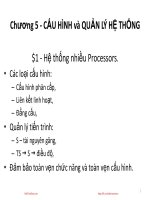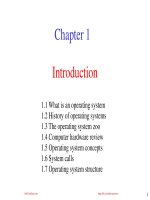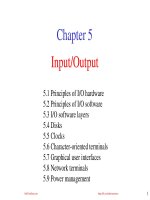hệ điều hành nguyễn văn hiệp chương ter 08 multi processor system sinhvienzone com
Bạn đang xem bản rút gọn của tài liệu. Xem và tải ngay bản đầy đủ của tài liệu tại đây (4.42 MB, 55 trang )
Chapter 8
Multiple Processor Systems
8.1 Multiprocessors
8.2 Multicomputers
8.3 Distributed systems
SinhVienZone.com
/>
Multiprocessor Systems
• Continuous need for faster computers
– shared memory model
– message passing multiprocessor
– wide area distributed system
SinhVienZone.com
/>
Multiprocessors
Definition:
A computer system in which two or
more CPUs share full access to a
common RAM
SinhVienZone.com
/>
Multiprocessor Hardware (1)
Bus-based multiprocessors
SinhVienZone.com
/>
4
Multiprocessor Hardware (2)
• UMA Multiprocessor using a crossbar switch
SinhVienZone.com
/>
Multiprocessor Hardware (3)
• UMA multiprocessors using multistage switching
networks can be built from 2x2 switches
(a) 2x2 switch
SinhVienZone.com
(b) Message format
/>
Multiprocessor Hardware (4)
• Omega Switching Network
SinhVienZone.com
/>
Multiprocessor Hardware (5)
NUMA Multiprocessor Characteristics
1. Single address space visible to all CPUs
2. Access to remote memory via commands
-
LOAD
STORE
3. Access to remote memory slower than to local
SinhVienZone.com
/>
Multiprocessor Hardware (6)
(a) 256-node directory based multiprocessor
(b) Fields of 32-bit memory address
(c) Directory at node 36
SinhVienZone.com
/>
Multiprocessor OS Types (1)
Bus
Each CPU has its own operating system
SinhVienZone.com
/>
Multiprocessor OS Types (2)
Bus
Master-Slave multiprocessors
SinhVienZone.com
/>
Multiprocessor OS Types (3)
Bus
• Symmetric Multiprocessors
– SMP multiprocessor model
SinhVienZone.com
/>
Multiprocessor Synchronization (1)
TSL instruction can fail if bus already locked
SinhVienZone.com
/>
Multiprocessor Synchronization (2)
Multiple locks used to avoid cache thrashing
SinhVienZone.com
/>
Multiprocessor Synchronization (3)
Spinning versus Switching
• In some cases CPU must wait
– waits to acquire ready list
• In other cases a choice exists
– spinning wastes CPU cycles
– switching uses up CPU cycles also
– possible to make separate decision each time
locked mutex encountered
SinhVienZone.com
/>
Multiprocessor Scheduling (1)
• Timesharing
– note use of single data structure for scheduling
SinhVienZone.com
/>
Multiprocessor Scheduling (2)
• Space sharing
– multiple threads at same time across multiple CPUs
SinhVienZone.com
/>
Multiprocessor Scheduling (3)
• Problem with communication between two threads
– both belong to process A
– both running out of phase
SinhVienZone.com
/>
Multiprocessor Scheduling (4)
• Solution: Gang Scheduling
1. Groups of related threads scheduled as a unit (a gang)
2. All members of gang run simultaneously
on different timeshared CPUs
3. All gang members start and end time slices together
•
SinhVienZone.com
/>
Multiprocessor Scheduling (5)
Gang Scheduling
SinhVienZone.com
/>
Multicomputers
• Definition:
Tightly-coupled CPUs that do not share
memory
• Also known as
– cluster computers
– clusters of workstations (COWs)
SinhVienZone.com
/>
Multicomputer Hardware (1)
• Interconnection topologies
(a) single switch
(b) ring
(c) grid
SinhVienZone.com
(d) double torus
(e) cube
(f) hypercube
/>
Multicomputer Hardware (2)
• Switching scheme
– store-and-forward packet switching
SinhVienZone.com
/>
Multicomputer Hardware (3)
Network interface boards in a multicomputer
SinhVienZone.com
/>
Low-Level Communication Software (1)
• If several processes running on node
– need network access to send packets …
• Map interface board to all process that need it
• If kernel needs access to network …
• Use two network boards
– one to user space, one to kernel
SinhVienZone.com
/>









